直接引语和间接引语用法及练习(含答案)
- 格式:docx
- 大小:23.10 KB
- 文档页数:6
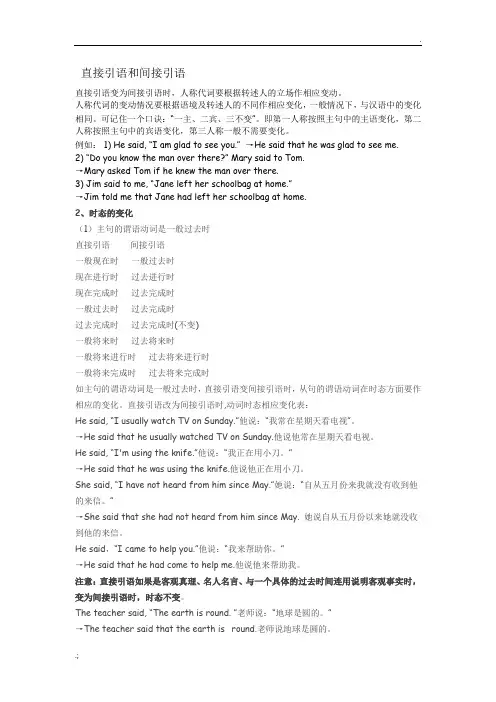
直接引语和间接引语直接引语变为间接引语时,人称代词要根据转述人的立场作相应变动。
人称代词的变动情况要根据语境及转述人的不同作相应变化,一般情况下,与汉语中的变化相同。
可记住一个口诀:“一主、二宾、三不变”。
即第一人称按照主句中的主语变化,第二人称按照主句中的宾语变化,第三人称一般不需要变化。
例如: 1) He said, “I am glad to see you.”→He said that he was glad to see me. 2) “Do you know the man over there?” Mary said to Tom.→Mary asked Tom if he knew the man over there.3) Jim said to me, “Jane left her schoolbag at home.”→Jim told me that Jane had left her schoolbag at home.2、时态的变化(1)主句的谓语动词是一般过去时直接引语间接引语一般现在时一般过去时现在进行时过去进行时现在完成时过去完成时一般过去时过去完成时过去完成时过去完成时(不变)一般将来时过去将来时一般将来进行时过去将来进行时一般将来完成时过去将来完成时如主句的谓语动词是一般过去时,直接引语变间接引语时,从句的谓语动词在时态方面要作相应的变化。
直接引语改为间接引语时,动词时态相应变化表:He said, “I usually watch TV on Sunday.”他说:“我常在星期天看电视”。
→He said that he usually watched TV on Sunday.他说他常在星期天看电视。
He said, “I'm using the knife.”他说:“我正在用小刀。
”→He said that he was using the knife.他说他正在用小刀。
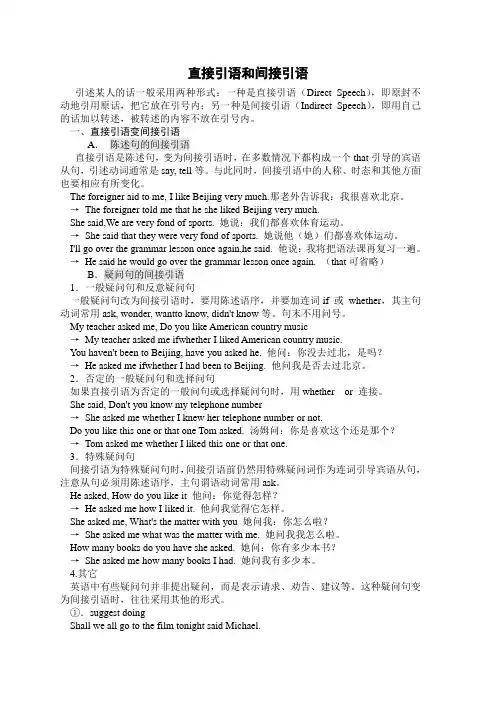
直接引语和间接引语引述某人的话一般采用两种形式:一种是直接引语(Direct Speech),即原封不动地引用原话,把它放在引号内;另一种是间接引语(Indirect Speech),即用自己的话加以转述,被转述的内容不放在引号内。
一、直接引语变间接引语A.陈述句的间接引语直接引语是陈述句,变为间接引语时,在多数情况下都构成一个that引导的宾语从句,引述动词通常是say, tell等。
与此同时,间接引语中的人称、时态和其他方面也要相应有所变化。
The foreigner aid to me, I like Beijing very much.那老外告诉我:我很喜欢北京。
→The foreigner told me that he she liked Beijing very much.She said,We are very fond of sports. 她说:我们都喜欢体育运动。
→She said that they were very fond of sports. 她说他(她)们都喜欢体运动。
I'll go over the grammar lesson once again,he said. 他说:我将把语法课再复习一遍。
→He said he would go over the grammar lesson once again. (that可省略)B.疑问句的间接引语1.一般疑问句和反意疑问句一般疑问句改为间接引语时,要用陈述语序,并要加连词if 或whether,其主句动词常用ask, wonder, wantto know, didn't know等。
句末不用问号。
My teacher asked me, Do you like American country music→My teacher asked me ifwhether I liked American country music.You haven't been to Beijing, have you asked he. 他问:你没去过北,是吗?→He asked me ifwhether I had been to Beijing. 他问我是否去过北京。
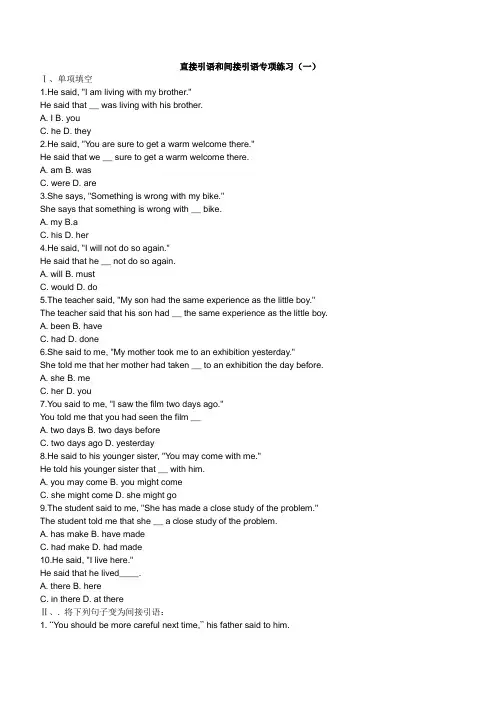
直接引语和间接引语专项练习(一)Ⅰ、单项填空1.He said, "I am living with my brother."He said that __ was living with his brother.A. IB. youC. heD. they2.He said, "You are sure to get a warm welcome there."He said that we __ sure to get a warm welcome there.A. amB. wasC. wereD. are3.She says, "Something is wrong with my bike."She says that something is wrong with __ bike.A. myB.aC. hisD. her4.He said, "I will not do so again."He said that he __ not do so again.A. willB. mustC. wouldD. do5.The teacher said, "My son had the same experience as the little boy." The teacher said that his son had __ the same experience as the little boy.A. beenB. haveC. hadD. done6.She said to me, "My mother took me to an exhibition yesterday."She told me that her mother had taken __ to an exhibition the day before.A. sheB. meC. herD. you7.You said to me, "I saw the film two days ago."You told me that you had seen the film __A. two daysB. two days beforeC. two days agoD. yesterday8.He said to his younger sister, "You may come with me."He told his younger sister that __ with him.A. you may comeB. you might comeC. she might comeD. she might go9.The student said to me, "She has made a close study of the problem." The student told me that she __ a close study of the problem.A. has makeB. have madeC. had makeD. had made10.He said, "I live here."He said that he lived____.A. thereB. hereC. in thereD. at thereⅡ、. 将下列句子变为间接引语:1. “You should be more careful next time,” his father said to him.2. Mr. Wang said, “I will leave for Shanghai on business next month, children.”3. “I haven’t heard from my parents these days,” said Mary.4. The geography teacher said to us, “The moon moves around the earth and the earth goes round the sun.”5. She said to him, “It’s time that you left here.”6. Zhang Hong said to me, “Doctor Wang passed away in 1948.”7. John said to his parents, “I had learned 500 Chinese words by the end of last term.”8. The history teacher said to them, “The Chinese Communist Party was founded on July 1st , 1921.”9. He said, “Are you a student?”10. “Have you anything interesting I can read, George?” she said.11. “She’s here to ask for help, isn’t she?” he asked.12. “Where are you going?” the father asked his son.13. “Are you sorry for what you have done?” the mother asked the naughty boy.14. She said, “Did you meet this man at the station two hours ago, Mr. Li?”15. “Write your names on your papers first,” the teacher said to us.16. “Please come here again tomorrow,” her friend said to her.17. “Let me pack the parcel for you,” he said.18. “Don’t make so much noise in class, boys and girls,” said the teacher.19. “What a lovely day it is!”20. “Happy New Year to you!” he said.III. 把下列句子变为直接引语:1. I told him that I had lost my money and that I would find it.2. She asked whether I would be free the next day or not.3. I asked her where she was going and what she was going to do the next day.4. His father told him not to climb that high tree in his new coat.5. The stranger asked me what my name was.6. The teacher asked if we could do it.最佳答案1C 2C 3D 4C 5C 6C 7B 8D 9D 10AII. 1. His father told him that he should be more careful the next time.2. Mr. Wang told the children that he would leave for Shanghai on business the next month.3. Mary said that she hadn’t heard from her parents those days.4. The geography teacher told us that the moon moves around the earth and the earth goes round the sun.5. She told him that it was time that he left there.6. Zhang Hong told me that Doctor Wang passed away in 1948.7. John told his parents that he had learned 500 Chinese words by the end of last term.8. The history teacher told them that the Chinese Communist Party was founded on July 1st, 1921.9. He asked whether I was a student.10. She asked George if he had anything interesting she could read.11. He asked whether she was there to ask for help or not.12. The father asked his son where he was going.13. The mother asked the naughty boy if he was sorry for what he had done.14. She asked Mr. Li whether he had met that man at the station two hours before.15. The teacher told us to write our names on our papers first.16. Her friend asked her to go there again the next/ following day.17. He offered to pack the parcel for me.18. The teacher told the boys and girls not to make so much noise in class.19. He/ She exclaimed that it was really a lovely day.20. He wished me a Happy New Year.III. 1. I said to him, “I have lost my money . I will find it.”2. She asked , “ You will be free tomorrow, won’t you?”3. I asked her, “Where are you going and what are you going to do tomorrow?”4. His father said, “Don’t climb this high tree in your new coat.”5. The stranger asked, “ What’s your name?”6. “I’ll finish my work tomorrow,” she said.7. The teacher asked, “Can you do it ?”8. The commander ordered his men, “Don’t cross the river before dawn.”9. My teacher asked, “Is he coming?”10. The scientist asked me, “What are you doing?”直接引语和间接引语专项练习(二)1. “You’ve already got well, haven’t you?” she asked.→She asked ________.A. if I have already got well, hadn’t youB. whether I had already got wellC. have I already got wellD. had I already got well.2. He asked , “ Are you a Party member or a League member?”→He asked me _________.A. am I a Party member or a League memberB. was I a Party member or a League memberC. if I was a Party member or a League memberD. whether was I a Party member or a League member.3. He asked, “How are you getting along?”→He asked _______.A. how am I getting alongB. how are you getting alongC. how I was getting alongD. how was I getting along4. He asked me ________ with me.A. what the matter isB. what the mater wasC. what’s the matterD. what was the matter5. He said, “Don’t do that again.” He _____ me _______ that again.A. said to me; not to doB. said to me; don’t doC. told me; don’t doD. told me; not to do6. Can you make sure ___________?A. that he will come here todayB. when he will come here todayC. will he come here todayD. whether will he come here today7. Do you happen to know ________?A. where is her addressB. in which place is her addressC. what her address isD. the place her address is8. Excuse me, but can you tell me ___________?A. where can I get to the libraryB. where I can get to the libraryC. how can I get to the libraryD. how I can get to the library9. John asked me _______ to visit his uncle’s farm with him.A. how would I likeB. if or not would I likeC. whether I would likeD. which I would like10. I’d like to know ________ Chinese.A. when he began to learnB. when did he begin to learnC. when did he begin learningD. for how long he began to learnII. 将下列句子变为间接引语:1. “You should be more careful next time,” his father said to him.2. Mr. Wang said, “I will leave for Shanghai on business next month, children”3. “I haven’t heard from my parents these days,” said Mary.4. The geography teacher said to us, “The moon moves around the earth and the earth goes round the sun.”5. She said to him, “It’s time that you left here.”6. Zhang Hong said to me, “Doctor Wang passed away in 1948.”7. John said to his parents, “I had learned 500 Chinese words by the end oflast term.”8. The history teacher said to them, “The Chinese Communist Party was founded on July 1st ,1921.”9. He said, “Are you a student?”10. “Have you anything interesting I can read, George?” she said.11. “She’s here to ask for help, isn’t she?” he asked.12. “Where are you going?” the father asked his son.13. “Are you sorry for what you have done?” the mother asked the naughty boy.14. She said, “Did you meet this man at the station two hours ago, Mr. Li?”15. “Write your names on your papers first,” the teacher said to us.16. “Please come here again tomorrow,” her friend said to her.17. “Let me pack the parcel for you,” he said.18. “Don’t make so much noise in class, boys and girls,” said the teacher.19. “What a lovely day it is!”20. “Happy New Year to you!” he said.III. 把下列句子变为直接引语:1. I told him that I had lost my money and that I would find it.2. She asked whether I would be free the next day or not.3. I asked her where she was going and what she was going to do the next day.4. His father told him not to climb that high tree in his new coat.5. The stranger asked me what my name was.6. She said that she would finish her work the next day.7. The teacher asked if we could do it.8. The commander ordered his men not to cross the river before dawn.9. My teacher asked whether he was coming.10. The scientist asked me what I was doing.答案I. 1~5 B C C D D 6~10 A C D C AII.1. His father told him that he should be more careful the next time.2. Mr. Wang told the children that he would leave for Shanghai on business the next month.3. Mary said that she hadn’t heard from her parents those days.4. The geography teacher told us that the moon moves around the earth and the earth goes round the sun.5. She told him that it was time that he left there.6. Zhang Hong told me that Doctor Wang passed away in 1948.7. John told his parents that he had learned 500 Chinese words by the end of last term.8. The history teacher told them that the Chinese Communist Party was founded on July 1st, 1929. He asked whether I was a student.10. She asked George if he had anything interesting she could read.11. He asked whether she was there to ask for help or not.12. The father asked his son where he was going.13. The mother asked the naughty boy if he was sorry for what he had done.14. She asked Mr. Li whether he had met that man at the station two hours before.15. The teacher told us to write our names on our papers first.16. Her friend asked her to go there again the next/ following day.17. He offered to pack the parcel for me.18. The teacher told the boys and girls not to make so much noise in class.19. He/ She exclaimed that it was really a lovely day.20. He wished me a Happy New Year.III.1. I said to him, “I have lost my money . I will find it.”2. She asked , “ You will be free tomorrow, won’t you?”3. I asked her, “Where are you going and what are you going to do tomorrow?”4. His father said, “Don’t climb this high tree in your new coat.”5. The stranger asked, “ What’s your name?”6. “I’ll finish my work tomorrow,” she said.7. The teacher asked, “Can you do it ?”8. The commander ordered his men, “Don’t cross the river before dawn.”9. My teacher asked, “Is he coming?”10. The scientist asked me, “What are you doing?”直接引语和间接引语专项练习(三)1 He said , “Mother, the boy is very naughty.”2 He said to me, “I have left my book in your room.”3 Kitty said “I’ll call again after supper this evening.”4 She said, “I will come here again tonight.”5 He said, “I arrived yesterday morning.”6 She said , “My sister will be back tomorrow morning.”7 “The children had better go to bed early,” she said.8 He said , “I have lost my umbrella.”9 Paul said, “I’m trying to get a taxi.”10 “I never eat meat.” He explained.11 “Have you been here for ages?” she said.12 “I took the dictionary home with me,” he said.13 “Frank, I came to return you the book,” Henry said.14 He asked, “Are you sure your mother will come?’15 He asked, “Are you a teacher or a student?”16 He said to me, “Please come again tomorrow.”17 He said to me, “Don’t do that again.”18 He said, “Where is she going?”19 “Who lives next door?” she asked.20 “What’s happened?” he asked.21 “Where is the airport?” he asked.22.”What have you got in your bag?” the asked .23 “Mary, when is the next train?” he asked.24 “Why did you stop the car, Tom? ” she asked.25 “Is there anyone here?” he asked.26 “Do you know Mrs Green?” he asked me.27 “Shall I wait for them or shall I go on?” the man asked.28 “Shall I lock the car or leave it unlocked?” she asked.29 “Will you be here tomorrow?” he asked me.30 “Would you like to come in for a drink?” she asked Bill.31 “Could me give me a hand?” Mr Black asked Tom.32 “You’ll be back tonight, won’t you?” my wife asked me.33 “Don’t swim out too far, children,” mother said.34 “Please let me have a try.” Jane said to the teacher.35 “Do sit down, everybody.” said the hostess.36 “Please don’t take any risks,” said his wife.37 “Don’t forget to take your pills,” said mother to his daughter.38 “Put down your gun, man!” said the inspector.39 “Be quiet, girls.” said the old man.40 “Bring your textbook with you tomorrow, please.” The teacher said to her.41 I asked Wang Dong “Are there any spelling mistakes in my exercises?”直接引语和间接引语专项练习(四)将所给直接引语变为间接引语,每空一词:1. “I never eat meat.” he said.He said that ______ never ______ meat.2. “I’ve found my wallet.” he said to me.He ______ me that he ______ ______ ______ wallet.3. “I took it home with me.” she said.She said that ______ ______ _______ it home with her.4. The teacher said, “The sun rises in the east and goes down in the west.”The teacher said that the sun ______ in the east and ______ down in the west.5. “I met her yesterday.” he said to me.He ______ me that he ______ met the day ______.6. “You must come here before five.” he said.He said that I ______ to go ______ before five.7. “I bought the house 10 years ago.” he said.He said that he _______ bought the house 10 years _______.8. “Did you see her last week?” he said.He ______ ______ I had seen her the week _______.9. He said, “You can sit here, Jim.”He ______ Jim that he ______ sit there10. He asked, “How did you find it, mother?”He asked her mother ______ ______ ______ found it.11. “Where have you been these days?” he asked.He asked me _______ _______ _______been _______ days.12. “Do you know where she lives?” he asked.He asked ______ ______ knew where she ______.13. “Stop making so much noise, children.” he said.He ______ the children ______ ______ making so much noise.14. “Don’t tell him the news.” she said.She told me _______ ______ ______ him the news.15. “Are you intested in this?” he said.He ______ ______ I was interestd in ______.【参考答案】1. he, ate2. told, had, found, his3. she, had, taken4. rise, goes5. told, had, before6. had, there7. had, before 8. asked, if [whether], before9. told, could 10. how, she, had11. where, I, had, those 12. if [whether], I, lived13. told, to, stop 14. not, to, tell15. asked, if [whether], that直接引语和间接引语专项练习(五)将所给直接引语变为间接引语1.He said: “I’ve left my book in my room.”2.She said: “He will be busy.”3.She said to Tom, “Can you help me?”4.She asked, “Is this book yours or his?”5.The teacher asked, “how did you repair it?”6.The teacher said to the students, “Don’t waste your time.”7.The mother said, “Tom, get up early, please.”8.The teacher said, “The earth goes round the sun.”9.My father said, “Practice makes perfect.”10.The boy said to us, “ I usually get up at six every day.”11.He said, “We are still students.’12.He said to me, “I was born in 1978.13.The engineer said, “I was at college in 1967.”14.He said, “I have studied English since I was a boy.”15.She said, “I read the book while I was waiting for a bus.16.Mr. Green said to them, “Joe told me all about his story when he asked for a job.”17.He said, “We insisted that she start immediately.18.She said, “He demanded that the girl leave at once.”19.I said to him, “I have finished it.”20.She said to us,“ I’ll come here tomorrow.”21.“Where does your chemistry teacher live, Karen?” the young man asked.22.“I have gained the first place in the mathematics competition,” the little boy said happily.23.“Light travels faster than sound,” the physics teacher said to the boys and girls.24.“Will you go to the concert with me this evening?” Mary asked me.25.“What did you do here yesterday?” the old man asked my brother.附答案:【参考答案1】1. he, ate2. told, had, found, his3. she, had, taken4. rise, goes5. told, had, before6. had, there7. had, before 8. asked, if [whether], before9. told, could 10. how, she, had11. where, I, had, those 12. if [whether], I, lived13. told, to, stop 14. not, to, tell15. asked, if [whether], that附答案:【参考答案2】1.He told me that he had left his book in his room.2.She said that he would be busy.3.She asked Tom if /whether he could help her.4.She asked me whether that book was mine or his.5.The teacher asked me how I had repaired it.6.The teacher told the students not to waste their time.7.The mother asked Tom to get up early.8.The teacher said that the earth goes round the sun.9.My father said practice makes perfect.10.The boy told us he usually gets up at six every day.11.He said they are still students.12.He told me that he was born in 1978.13.The engineer said he was at college in 1967.14.He said he had studied English since he was a boy.15.She said she had read the book while she was waiting for a bus.16.Mr. Green told them Joe had told him all about his story when he asked for a job.17.He said they (had) insisted that she start immediately.18.She said he demanded that the girl leave at once.19.I told him I had finished it.20.She told us she would come here tomorrow21.The young man asked Karen where her chemistry teacher lived.22.The little boy said happily that he had gained the first place in the mathematics competition. 23.The physics teacher told the boys and girls that light travels faster than sound.24.Mary asked me if / whether I would go to the concert with her that evening.25.The old man asked my brother what he had done there the day before.直接引语和间接引语专项练习(六)1. Our teacher asked us _____ our dictionaries to school.A. bringB. broughtC. bringD. to bring2. The teacher told the boy students ______ football on the grass.A. not playB. not to playC. playedD. playing3. ____ Tom didn’t go to school?A. Do you know howB. Why do you knowC. How you know whyD. Do you know why4. She looks sad. Could you please tell me _____ that prevents her from being as happy as before?A. what it isB. it is whatC. how it isD. it is how5. Betty asked her sister ____ to the railway station to see her off.A. not to comeB. not to goC. to not comeD. to not go6. The pupil asked his teacher _____ round the earth.A. weather the moon goesB. that the moon wentC. whether the moon goesD. whether the moon went7. Mr. Li ____ Wang Ling ____ a taxi to the airport.A. asked; takeB. asked; takingC. told; takeD. told; to take8. She asked him ____.A. whose dictionary this isB. whose dictionary that wasC. whose dictionary is thisD. whose dictionary that is9. Mary’s mother asked her _____.A. that whether she had finished her homeworkB. if she has finished her homeworkC. if she had finished her homeworkD. that if she had finished her homework10. Do you know ____?A. what is he doingB. what he doingC. what he is doingD. what does he do now11. I don’t know ____ to learn English.A. when did he beginB. when he beganC. he when beganD. when he begins12. He asked me ____.A. how would the weather be like tomorrowB. what the weather would be like the next dayC. how the weather would be like tomorrowD. what would the weather be like the next day13. You can’t imagine ____ when they received these nice Spring Festival presents.A. how excited they wereB. how excited were theyC. how they were excitedD. they were how excited14. She told me that she ____ by her relatives at the bus stop.A. had been seen offB. have seen offC. have been seen offD. had seen off15. Do you remember how many times ____ to Australia?A. had you beenB. did you goC. have you beenD. you have been16. Can you guess ____?A. what is that manB. who that man isC. whom that man isD. who is that man17. More and more students and teachers have began to know ____.A. how important the foreign language areB. how the foreign language is importantC. how important the foreign language isD. how important is the foreign language18. The hostess said that it ___ time that they ___ supper.A. was; hadB. was; had hadC. is; haveD. is; have had19. The boss asked his secretary ____ he had finished typing the report ____.A. if; or notB. if; notC. whether; or notD. whether; not20. I wonder how much _____.A. does he spend on his carB. did he spend on his carC. he spent on his carD. he spent in his car直接引语和间接引语专项练习(七)1."My mother took me to an exhibition yesterday."she said.2."We are going to study in Australia next month."they said.3."I'm checking your home work now."his mother said.4."Can you tell me how to get to the nearest restaurant?"the man asked the policeman5."Is your son going to Shanghai today or tomorrow?"he asked.6."Do you remember what your aunt told you last night?"Li ping's father asked him.7."Where shall i get off to change to a No.3 bus?"he asked the conductor.8."How many car factories have been built in your country?"he asked me.9."What did Edison do to help the doctor operate on his mother ?"the teacher asked.10." Go to the front at once!"the officer said to the soldiers.直接引语变间接引语专项练习题三巩固练习答案:1—5DBDAB; 6—10CDBCC;11—15BBAAD;16—20BCACC练习题四答案:1.She said her mother had took her to an exhibition the day before .2.They said they were going to study in Australia the next month.3.His mother said she was checking his homework then .4.The man asked the policeman if he could tell him how to get to the nearest restaurant.5.He asked whether my son was going to Shanghai that day or the next day.6.Li ping's father asked him if he rememberred what his aunt had told him the night before.7.He asked the conductor where he could get off to change to a No.3 bus.8.He asked me how many car factories had been built in my country.9.The teacher asked what Edison had do to help the doctor operate on his mother.10.The officer asked the soldiers to go to the front at once.直接引语变间接引语专项练习题五一、将所给直接引语变为间接引语,每空一词:1. “I am having supper,” he said.He said that _______ _______ having supper.2. “I’ve seen the film,” Gina said to me.Gina _______ me that she _______ _______ the film.3. “I went home with my sister,” she said.She said that _______ _______ _______ home with her sister.4. The teacher said, “The sun is bigger than the moon.”The teacher said that the sun _______ bigger than the moon.5. “I met her yesterday,” he said to me.He told me that he _______ met her the day _______.6. “You must come here before five,” he said.He said that I _______ to go _______ before five.7. “I bought the computer two weeks ago,” she said.She said that she _______ bought the computer two weeks _______.8. “Did you read the book last week?” he said.He _______ _______ I had read the book the week _______.9. He said, “You can sit here, Jim.”He _______ Jim that he _______ sit there10. He asked, “How did you find it, mother?”He asked her mother _______ _______ _______ found it.11. “Where have you been these days?” he asked.He asked me _______ _______ _______ been _______ days.12 “Do you know where she lives?” he asked.He asked _______ _______ knew where she _______.13. “Keep quiet, children.” he said.He _______ the children _______ _______ quiet.14. “Don’t look out of the window,” she said.She told me _______ _______ _______ out of the window.15. “Are you interested in this?” he said.He _______ _______ I was interested in _______.【练习5答案详解】1. he, was。


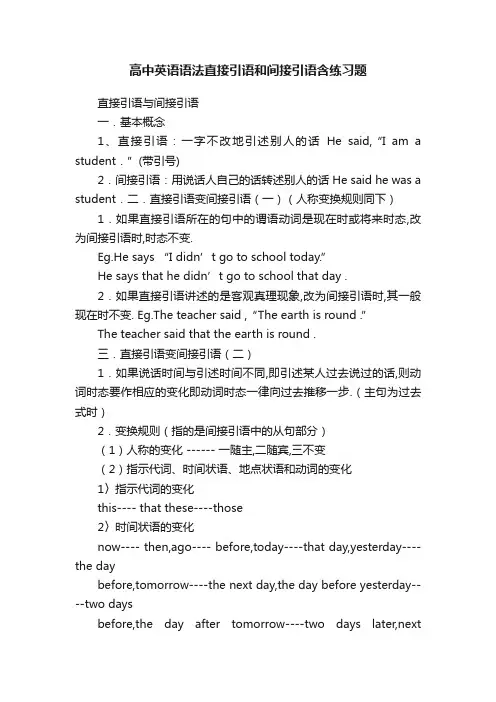
高中英语语法直接引语和间接引语含练习题直接引语与间接引语一.基本概念1、直接引语:一字不改地引述别人的话He said,“I am a student.”(带引号)2.间接引语:用说话人自己的话转述别人的话 He said he was a student.二.直接引语变间接引语(一)(人称变换规则同下)1.如果直接引语所在的句中的谓语动词是现在时或将来时态,改为间接引语时,时态不变.Eg.He says “I didn’t go to school today.”He says that he didn’t go to school that day .2.如果直接引语讲述的是客观真理现象,改为间接引语时,其一般现在时不变. Eg.The teacher said ,“The earth is round .”The teacher said that the earth is round .三.直接引语变间接引语(二)1.如果说话时间与引述时间不同,即引述某人过去说过的话,则动词时态要作相应的变化即动词时态一律向过去推移一步.(主句为过去式时)2.变换规则(指的是间接引语中的从句部分)(1)人称的变化 ------ 一随主,二随宾,三不变(2)指示代词、时间状语、地点状语和动词的变化1〉指示代词的变化this---- that these----those2〉时间状语的变化now---- then,ago---- before,today----that day,yesterday----the daybefore,tomorrow----the next day,the day before yesterday----two daysbefore,the day after tomorrow----two days later,nextweek/month,etc.---- the next week/month,/doc/2a17542514.html,stweek/month,etc.---- the week/month before3〉地点状语的变化here----there4〉动词的变化come----go(3)时态的变化1〉一般现在时-------一般过去时2〉现在进行时-------过去进行时3〉现在完成时-------过去完成时4〉一般过去时-------过去完成时5〉过去完成时-------过去完成时6〉一般将来时-------过去将来时四.变换类型1.直接引语为陈述句直接引语为陈述句,用that引导(口语中可以省略).e.g.直接引语:The teacher told the students,“I will give you a surprise.”间接引语:The teacher told the students that she would give them asurprise.2.直接引语为疑问句(1)直接引语为一般疑问句时,由whether或if引导,用陈述句的语序e.g.直接引语:He said to us,“Are you going away today?”间接引语:He asked us whether/if we were going away that day.直接引语为疑问句(2)直接引语为特殊疑问句时,其关联词用相应的疑问代词或疑问副词,其后用陈述语序e.g.直接引语:She asked,“Who will help me finish the job?”间接引语:She asked who would help her finish the job.e.g.直接引语:He asked,“What have you done?”间接引语:He asked what I had done.直接引语为疑问句(3)直接引语为选择疑问句,变为间接引语时应用whether…or…e.g.直接引语:“Do you like tea or coffee?” she asked me.间接引语:She asked me whether I liked tea or coffee.3.直接引语为祈使句直接引语为祈使句,变为间接引语时将祈使句的动词原形变为带to 的不定式.它的否定是在to前加not.它没有时态的变化.其他的变化和直接引语是陈述句的情况相同.e.g.直接引语:I said to her,“Please give me a glass of wa ter.”间接引语:I asked her to give me a glass of water.直接引语:He said,“Don’t make so much noise,boys.”间接引语:He told the boys not to make so much noise.4.直接引语为感叹句直接引语若是感叹句,变为间接引语时多采用宾语从句结构,即可用what或how 引导,也可用that引导e.g.直接引语:“What a clever boy you are!”,my teacher said to him.间接引语:My teacher told him what a clever boy he was.My teacher told him that he was a very clever boy.英语小题集练——直接引语和间接引语1、— Could you tell me ______?—Yes. It’s next to the supermarket.A.where the post office isB.where was the post officeC.where is the post officeD.where the post office was2、My brother said, “I’m watching TV now.”My brother said watching TV .A.he, was, now B.I, was, thenC.I, am, that day D.he, was, then3、—Do you know____________?—It’s about ten minutes’ walk.A.how many minutes do you walk to the nearest hospital B.which is the way to the nearest hospitalC.how long did you reach the nearest hospitalD.how far it is to the nearest hospital from here4、-- Do you know ________ the new computer yesterday? -- Sorry, I have no idea.A.how much did she pay for B.how much will she pay for C.how much she paid for D.how much she will pay for5、Jenny is on holiday now. I wonder ________.A.when she will come back B.when she came backC.when will she come back D.when did she come back6、Would you please tell me ______ this book?A.where you bought B.where did you buyC.where you buy D.where do you buy7、— Could you tell me_____ ?— About half an hour.A.how long it takes to walk to the Science and Technology Museum from schoolB.how long it took to walk to the Science and Technology Museum from schoolC.how far was it to walk to the Science and TechnologyMuseum from schoolD.how far it was to walk to the Science and Technology Museum from school.8、I ______ that he’s a hardw orking teacherA.never doubt B.always doubt C.seldom ask D.often wonder答案1、2、3、4、5、6、7、8、直接引语和间接引语专项练习一、把下列的句子变成间接引语:1. “I’m leaving for London next week.” My sister said to me.2. John said, “Mr. Smith has come here.”3. She said, “Do you want me to help you?”4. “Does the man in the shop find his wallet at last?” She said.5. Mum said to the newcomer, “Can you speak English?”6. “How many people are there in your family?” He asked the boy.7. He said to me, “I have left my book in your room.”8. Kitty said “I’ll call again after supper this evening.”9. S he said, “I will come here again tonight.”10. He said, “I arrived yesterday morning.”11. She said , “My sister will be back tomorrow morning.”12. “Who lives next door?” she asked.13. He said , “I have lost my umbrella.”14. Paul said, “I’m trying to get a taxi.”15. “Frank, I came to return you the book,” Henry said.16. He asked me, “Are you a teacher or a student?”二、把下列句子变成直接引语:23. Father asked me who had broken the window.24. She asked me which one I liked the best.25. He asked whether I had watched TV the night before.26. Jim asked me if I was busy that day.27. Pick said that he would take Mary there the next time.三、扩展练习:宾语从句。
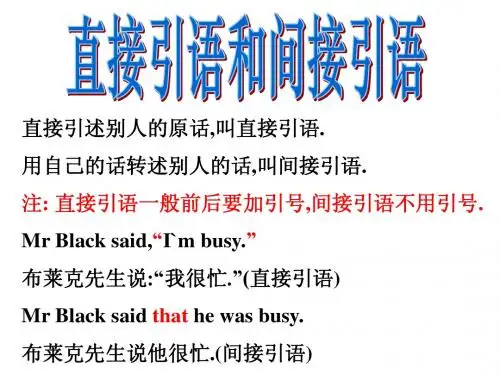
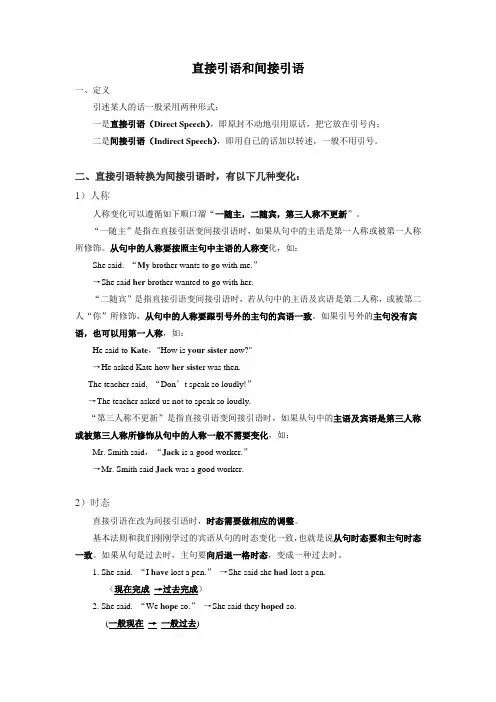
直接引语和间接引语一、定义引述某人的话一般采用两种形式:一是直接引语(Direct Speech),即原封不动地引用原话,把它放在引号内;二是间接引语(Indirect Speech),即用自己的话加以转述,一般不用引号。
二、直接引语转换为间接引语时,有以下几种变化:1)人称人称变化可以遵循如下顺口溜“一随主,二随宾,第三人称不更新”。
“一随主”是指在直接引语变间接引语时,如果从句中的主语是第一人称或被第一人称所修饰。
从句中的人称要按照主句中主语的人称变化,如:She said.“My brother wants to go with me.”→She said her brother wanted to go with her.“二随宾”是指直接引语变间接引语时,若从句中的主语及宾语是第二人称,或被第二人“你”所修饰,从句中的人称要跟引号外的主句的宾语一致。
如果引号外的主句没有宾语,也可以用第一人称,如:He said to Kate,"How is your sister now?"→He asked Kate how her siste r was then.The teacher said, “Don’t speak so loudly!”→The teacher asked us not to speak so loudly.“第三人称不更新”是指直接引语变间接引语时,如果从句中的主语及宾语是第三人称或被第三人称所修饰从句中的人称一般不需要变化,如:Mr. Smith said,“Jack is a good worker.”→Mr. Smith said Jack was a good worker.2)时态直接引语在改为间接引语时,时态需要做相应的调整。
基本法则和我们刚刚学过的宾语从句的时态变化一致,也就是说从句时态要和主句时态一致。
如果从句是过去时,主句要向后退一格时态,变成一种过去时。
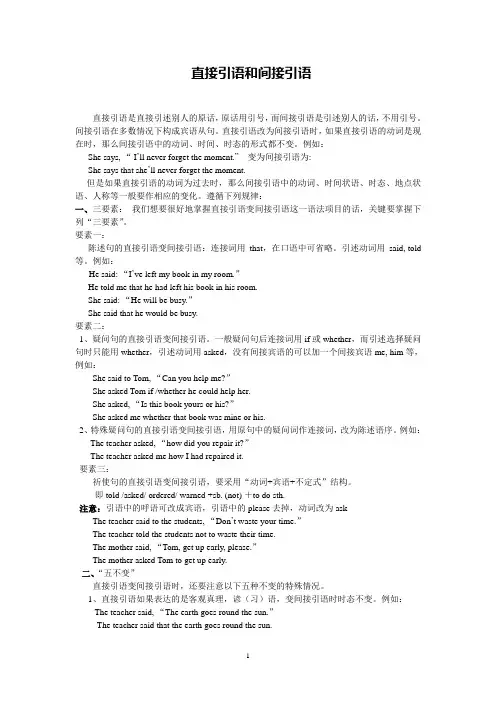
直接引语和间接引语直接引语是直接引述别人的原话,原话用引号,而间接引语是引述别人的话,不用引号。
间接引语在多数情况下构成宾语从句。
直接引语改为间接引语时,如果直接引语的动词是现在时,那么间接引语中的动词、时间、时态的形式都不变。
例如:She says, “ I’ll never forget the moment.”变为间接引语为:She says that she’ll never forget the moment.但是如果直接引语的动词为过去时,那么间接引语中的动词、时间状语、时态、地点状语、人称等一般要作相应的变化。
遵循下列规律:一、三要素:我们想要很好地掌握直接引语变间接引语这一语法项目的话,关键要掌握下列“三要素”。
要素一:陈述句的直接引语变间接引语:连接词用that,在口语中可省略。
引述动词用said, told 等。
例如:He said: “I’ve left my book in my room.”He told me that he had left his book in his room.She said: “He will be busy.”She said that he would be busy.要素二:1、疑问句的直接引语变间接引语。
一般疑问句后连接词用if或whether,而引述选择疑问句时只能用whether,引述动词用asked,没有间接宾语的可以加一个间接宾语me, him等,例如:She said to Tom, “Can you help me?”She asked Tom if /whether he could help her.She asked, “Is this book yours or his?”She asked me whether that book was mine or his.2、特殊疑问句的直接引语变间接引语,用原句中的疑问词作连接词,改为陈述语序。
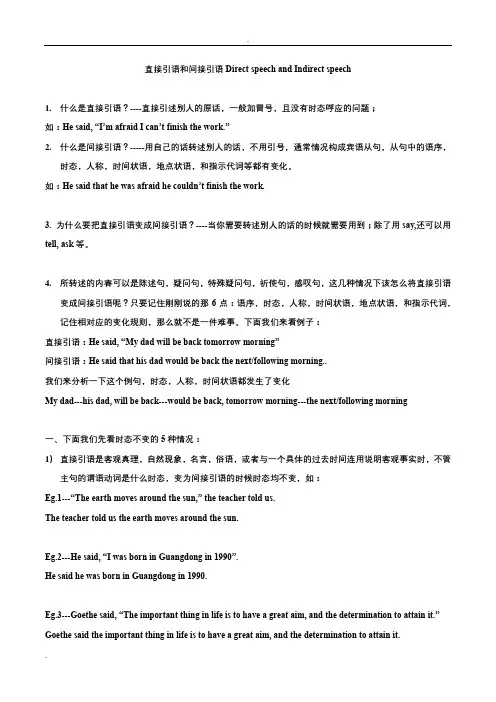
直接引语和间接引语Direct speech and Indirect speech1.什么是直接引语?----直接引述别人的原话,一般加冒号,且没有时态呼应的问题;如:He said, “I’m afraid I can’t finish the work.”2.什么是间接引语?-----用自己的话转述别人的话,不用引号,通常情况构成宾语从句,从句中的语序,时态,人称,时间状语,地点状语,和指示代词等都有变化。
如:He said that he was afraid he couldn’t finish the work.3. 为什么要把直接引语变成间接引语?----当你需要转述别人的话的时候就需要用到;除了用say,还可以用tell, ask等。
4.所转述的内容可以是陈述句,疑问句,特殊疑问句,祈使句,感叹句,这几种情况下该怎么将直接引语变成间接引语呢?只要记住刚刚说的那6点:语序,时态,人称,时间状语,地点状语,和指示代词,记住相对应的变化规则,那么就不是一件难事。
下面我们来看例子:直接引语:He said, “My dad will be back tomorrow morning”间接引语:He said that his dad would be back the next/following morning..我们来分析一下这个例句,时态,人称,时间状语都发生了变化My dad---his dad, will be back---would be back, tomorrow morning---the next/following morning一、下面我们先看时态不变的5种情况:1)直接引语是客观真理,自然现象,名言,俗语,或者与一个具体的过去时间连用说明客观事实时,不管主句的谓语动词是什么时态,变为间接引语的时候时态均不变,如:Eg.1---“The earth moves around the sun,” the teacher told us.The teacher told us the earth moves around the sun.Eg.2---He said, “I was born in Guangdong in 1990”.He said he was born in Guangdong in 1990.Eg.3---Goethe said, “The important thing in life is to have a great aim, and the determination to attain it.”Goethe said the important thing in life is to have a great aim, and the determination to attain it.Eg.4:He said, “Practice makes perfect.”He said that practice makes perfect.2)主句的谓语动词是现在是或将来时,变成间接引语时时态不变Eg.1---He says, “I finished the work.”He says he finished the work.Eg.2---He will say, “I have watered the flower.”He will say he has watered the flower.Eg.3---He will say, “I will try my best to help you.”He will say he will try his best to help me.3)直接引语如果是一般现在时,表示反复出现或习惯性动作,变为间接引语时时态不变。
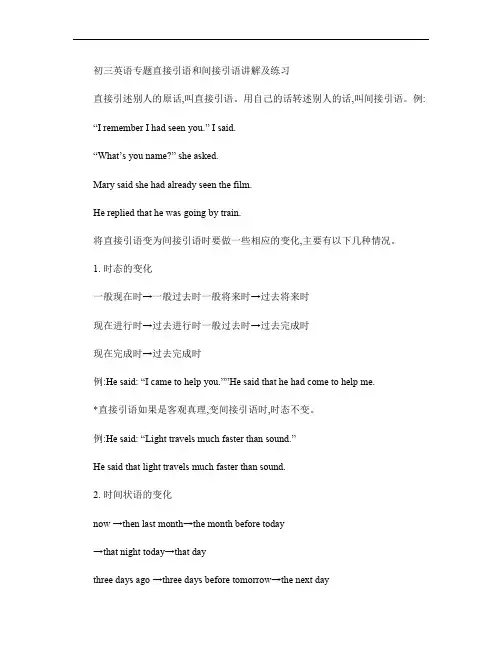
初三英语专题直接引语和间接引语讲解及练习直接引述别人的原话,叫直接引语。
用自己的话转述别人的话,叫间接引语。
例: “I remember I had seen you.” I said.“What’s you name?” she asked.Mary said she had already seen the film.He replied that he was going by train.将直接引语变为间接引语时要做一些相应的变化,主要有以下几种情况。
1. 时态的变化一般现在时→一般过去时一般将来时→过去将来时现在进行时→过去进行时一般过去时→过去完成时现在完成时→过去完成时例:He said: “I came to help you.””He said that he had come to help me.*直接引语如果是客观真理,变间接引语时,时态不变。
例:He said: “Light travels much faster than sound.”He said that light travels much faster than sound.2. 时间状语的变化now →then last month→the month before today→that night today→that daythree days ago →three days before tomorrow→the next daythis week→that week next month→the next month yesterday→the day beforethe day after tomorrow→in two days例:She said, “I went there yesterday.”She said that she had gone there the day before.3. 指示代词的变化this→that these→thoseShe said: “I will come this morning.”She said that she would go that morning.4. 地点状语的变化here→thereHe said, “My sister was here three days ago.”He said that his sister had been there three days before.5. 谓语动词的变化come →goShe said, “I will come here tomorrow.”She said that she would go there the next day.6. 人称的变化直接引语变间接引语相当于把直接引语变为宾语从句。
直接引语和间接引语的用法引述别人的话有两种方式:一是使用引号引出人家的原话,这叫做直接引语;一是用自己的话把人家的话转述出来,这叫做间接引语。
例如:John said, "I'm going to London with my father."约翰说:"我要和父亲到伦敦去。
"(引号内是直接引语)John said that he was going to London with his father.约翰说,他要和他父亲去伦敦。
(宾语从句是间接引语)由直接引语变为间接引语,分以下情况:1.直接引语是陈述句时间接引语为that引导的宾语从句(口语中that可以省略),主句的引述动词主要有say ,tell, repeat, explain, think等。
He said , "You are younger than I."-'He said (that ) I was younger than him.2.直接引语是疑问句时间接引语为陈述语序:主句的谓语动词say 改为ask,或改为wonder, do not know, want to know, be not sure, be puzzled等。
(1)一般疑问句或反意疑问句变为if (whether)引导的宾语从句。
She said, "Do you often come here to read newspapers?"→She asked me if (或whether)I often went there to read newspapers.She asked me , "You have seen the film, haven't you?"→She asked me whether(或if )I had seen the film.(2)选择疑问句变为whether….or 宾语从句。
直接引语和间接引语Direct Speech and Indirect Speech直接引述别人的原话,叫直接引语。
用自己的话转述别人的话,叫间接引语。
间接引语在多数情况下构成宾语从句。
直接引语一般前后要加引号;间接引语不用引号。
例如:直接引语:Mr. Black said, “I’m busy.”间接引语:Mr. Black said that he was busy.1.陈述句直接引语如果是陈述句,变为间接引语时,用连词that引导(that在口语中常省略),从句中的人称、时态、指示代词、时间状语、地点状语等要作相应的变化。
(1)人称的变化• He said, “I like it very much.”→ He said that he liked it very much.• He said, “I’ve left my book in your room.”→ He told me that he had left his book in my room.(2)时态的变化如主句的谓语动词是一般过去时,直接引语变间接引语时,从句的谓语动词在时态方面要作以下的变化:• He said, “I saw the film yesterday.”→ He said that he had seen the film the day• She said, “I have seen the film. It is good. ”→ She said that she had seen the film.直接引语如果是客观真理,变为间接引语时,时态不变。
例如:• He said, “Light travels much faster than sound.”→ He said that light travels much faster than sound.(3)指示代词、时间状语和地点状语的变化• She said, “I will come this evening.”→ She said that she would go that evening.• He said, “My sister was here three days ago, but she is not here now.”→ He said that his sister had been there three days before but she was not here then.现将这几种变化列表如下:以上这些变化,要根据说话的实际情况来定。
直接引语(直述句)与间接引语(转述句)互换定义:1、直接引语:直接引用别人的话。
如:妈妈说:“我今天加班。
”2、间接引语:用自己的话来转述别人话,不能用引号。
如:妈妈说,她今天加班。
直接引语(直述句)改为间接引语(转述句)的方法:1、“你”变“我”,“我”变“她/他”,冒号(:)变逗号(逗号),去掉双引号(“”),句尾用句号,只改双引号里面的。
/2、2、引语是疑问句的,要变成陈述的语气。
如:明明问我:“今天放学后,到我家写作业,行吗?”改为:明明问我,今天放学后,到他家写作业,行不行。
3、有称呼语的,称呼语要去掉如:老红军说:“小鬼,你骑上我的马吧!”改为:老红军说,让我骑上他的马。
间接引语(转述句)改为直接引语(直述句)的方法:反过来即可。
练习题一:把直接引语变成间接引语。
1.老师对我说:“我教你毛笔字的写法。
”2.梅花兴奋地说:“我是中国人,我怎么能忘掉祖国的语言呢?”3.他站起来对大家说:“孩子们,我要去开会了。
你们要听话。
”4.奶奶问我:“今天我还给你送饭吗?”5.妈妈说:“小明,今晚我加班,你自己做饭吃!”6.诸葛亮对鲁肃说:“你借给我二十条船,我自有妙用。
”7.小红军对陈赓说:“将军,我还要等我的同伴呢!”8.妈妈气喘吁吁地说:“我今晚有急事,你去姥姥家。
”9.江姐回答说:“上级的姓名地址,我知道,下级的姓名地址,我也知道。
”10.小明和小红在一起写作业,小明对小红说:“你能教我怎样写作文吗?”12.妈妈对小红说:“你这么小,一个人出门我不放心?”13.鲁肃对诸葛亮说:“都是你自己找的,我怎么帮得了你的忙?”14.“周瑜长叹一声,说:“诸葛亮神机妙算,我真比不上他!”15.刘明问小华:"你什么时候还我那本《故事会》?”16.老班长说:“我快不行了。
小梁,你要坚强些,带领两个小战士走出草地。
”17.李勤沮丧地对我说:"我的钢笔丢了,你能借我一支吗?”18.他凑到我耳边轻轻地问:“记者,你见过电灯吗?”19. 小红军对陈赓说:“我还要等我的同伴呢。
直接引语和间接引语的用法引述别人的话有两种方式:一是使用引号引出人家的原话,这叫做直接引语;二是用自己的话把人家的话转述出来,被转述的话不放在引号内,这叫做间接引语。
例如:John said, "I'm going to London with my father."约翰说:"我要和父亲到伦敦去。
"(引号内是直接引语)John said that he was going to London with his father.约翰说,他要和他父亲去伦敦。
(宾语从句是间接引语)间接引语在大多数情况下是一个宾语从句,直接引语变成间接引语时,要注意以下几点:人称、时态、指示代词、时间状语、地点状语、动词、句式的变化以及宾语从句要用陈述句语序。
一、如何变句型:1.直接引语是陈述句时,间接引语改为that引导的宾语从句(口语中that可以省略),主句的引述动词主要有say ,tell, repeat, explain, think等。
He said , "You are younger than I."-'He said (that ) I was younger than him.2. 直接引语是疑问句时,间接引语为陈述语序:主句的谓语动词say 改为ask,或改为wonder, do not know, want to know, be not sure, be puzzled等。
(1)直接引语是一般疑问句或反意疑问句时,间接引语变为if (whether)引导的宾语从句。
She said, "Do you often come here to read newspapers?"→She asked me if (或whether)I often went there to read newspapers.She asked me , "You have seen the film, haven't you?" →She asked me whether(或if )I had seen the film. 注意:大多数情况下,if 和whether 可以互换,但后有or not,或在动词不定式前,或放在介词后作连接词时,一般只用whether。
完整版)直接引语和间接引语练习题(附答案)1."Could you tell me where the post office is?" asked the person。
"Yes。
it's next to the supermarket," replied the other.2.My brother said he was watching TV at that moment.3."Do you know how far it is to the nearest hospital from here?" asked the person。
"It's about ten minutes' walk," replied the other.4."Do you know how much she paid for the new computer yesterday?" asked the person。
"Sorry。
I have no idea," replied the other.5."When will Jenny come back from her holiday?" wondered the person.6."Would you please tell me where you bought this book?" asked the person.1.My sister told me that she was leaving for London the following week.2.John said that Mr。
Smith had arrived.3.She asked if I wanted her to help me.4.She asked if the man in the shop had found his wallet.5.Mum asked the er if they could speak English.6.He asked the boy how many people were in their family.7.He told me that he had left his book in my room.8.Kitty said that she would call again after supper that evening。
间接引语时常改变进态,因为原来讲的话与转述这些话之间有一段时间间隔。
使用间接引语主要是为了简洁、紧凑地把话内容转述给第三者。
一. 直接引语1. 一字不改地引述别人的话,叫直接引语。
必须都用引号‘I never work on Sundays,‟ She said.‘我星期日从不工作,’她说。
二、间接引语说话人用自已的话转述别人的话,叫间接引再语。
间接引语需要由动词引述。
因此这种动词称为引述动词如say tell ask 等tell后面必须跟表示人称的间接宾语(tell sb….),而say后面则可跟或不跟to +讲话对象比较:He tells me/says to me that he‟s very busy.他说他很忙1.当引述动词为现在或将来时态,间接引语的时态不变:He says, …I‟m tired.‟他说:‘我累了。
’(直接引语)He says he is tired.他说他累了。
(间接引语)2.直接引语变间引语,其谓语动词时态变化规则如下:当引述动词为过去时态,直接引语变间接引语时,间接引语时态则一般应作相应变化,即时态呼应:一般现在时变成/一般过去时。
现在进行时变成/过去进行时。
现在完成时变成/过去完成时。
①一般现在时,变为一般过去时He said, … I never work on Sundays.‟他说,‘我星期日从来不工作。
’(直接引语为一般现在时)He said he neve r worked on Sundays.他说他星期天从不工作。
(间接引语变为一般过去时)②现在进行时,变为过去进行时She said, …he‟s waiting.‟她说;他在等待She said that he was waiting.她说他在等待。
③现在完成时,变为过去完成时Jack said, …I‟ve moved to another flat.‟杰克说:‘我搬到了另一套公寓里。
’He said that she had moved to another flat.他说他搬到了另一套公寓里。
直接引语和间接引语直接引语变为间接引语时,人称代词要根据转述人的立场作相应变动。
人称代词的变动情况要根据语境及转述人的不同作相应变化,一般情况下,与汉语中的变化相同。
可记住一个口诀:“一主、二宾、三不变”。
即第一人称按照主句中的主语变化,第二人称按照主句中的宾语变化,第三人称一般不需要变化。
例如: 1) He said, “I am glad to see you.”→He said that he was glad to see me. 2) “Do you know the man over there?” Mary said to Tom.→Mary asked Tom if he knew the man over there.3) Jim said to me, “Jane left her schoolbag at home.”→Jim told me that Jane had left her schoolbag at home.2、时态的变化(1)主句的谓语动词是一般过去时直接引语间接引语一般现在时一般过去时现在进行时过去进行时现在完成时过去完成时一般过去时过去完成时过去完成时过去完成时(不变)一般将来时过去将来时一般将来进行时过去将来进行时一般将来完成时过去将来完成时如主句的谓语动词是一般过去时,直接引语变间接引语时,从句的谓语动词在时态方面要作相应的变化。
直接引语改为间接引语时,动词时态相应变化表:He said, “I usually watch TV on Sunday.”他说:“我常在星期天看电视”。
→He said that he usually watched TV on Sunday.他说他常在星期天看电视。
He said, “I'm using the knife.”他说:“我正在用小刀。
”→He said that he was using the knife.他说他正在用小刀。
She said, “I have not heard from him since May.”她说:“自从五月份来我就没有收到他的来信。
”→She said that she had not heard from him since May. 她说自从五月份以来她就没收到他的来信。
He said,“I came to help you.”他说:“我来帮助你。
”→He said that he had come to help me.他说他来帮助我。
注意:直接引语如果是客观真理、名人名言、与一个具体的过去时间连用说明客观事实时,变为间接引语时,时态不变。
The teacher said, “The earth is round. ”老师说:“地球是圆的。
”→The teacher said that the earth is round.老师说地球是圆的。
(2)主句的谓语动词是现在时或将来时(3)如果主句的谓语动词是现在时或将来时,直接引语变为间接引语时,时态一律不变He says, “I finished the work.”他说:“我做完工作了。
”He says that he finished the work. 他说他做完工作了。
He will say, “I have watered the flowers.”他会说:“我己经浇花了。
”He will say he has watered the flowers. 他会说他己经浇花了。
3、指示代词、时间状语和地点状语的相应变化直接引语间接引语指示代词this/these that/those时间状语now thentoday that daytonight that nightthis week (month…)that week (month…)Yesterday the day beforelast week (month…)the week (month…)beforetwo weeks (month)ago two weeks (months)beforetomorrow the next daynext week (month…)the next week (month…)地点状语here there动词come---go Bring---takeHe said, “My sister was here three days ago.”他说:“三天前我妹妹在这儿。
”→He said that his sister had been there three days before.他说三天前他妹妹在那儿。
(here→there; ago→before)She said, “I will come here this evening.”她说:“今晚我将来这儿。
”→She said that she would go there that evening.她说那晚她将去那儿。
(come→go;here→there;this→that)以上这些变化,要根据说话的具体时间和具体地点的情况而定,不可机械照搬。
如果就在当地转述,here就不必改为there, come也不必改为go,如果就在当天转述,yesterday或tomorrow等时间状语也不必改变。
二、当直接引语是陈述句时直接引语是陈述句时,间接引语用that引导,但在口语中that可以省去。
从句中的人称、时态、指示代词、时间状语和地点状语等要作相应的变化。
例如: She said to me, “I came back an hour ago.”→She said to/told me that she had come back an hour before.三、当直接引语是一般疑问句、选择疑问句、反意疑问句时1、疑问句语序变为陈述句语序。
2、主句中的谓语动词为said时,要改为asked;没有间接宾语时,可以加一个间接宾语(如me,him等)。
3、句末用句号。
4、从句中的人称、动词时态和状语等也要作相应的变化。
5、原句若为一般疑问句时,用whether或if 转述; He said, “Are you interested in English?”→He asked (me) if /whether I was interested in English.6.原句若为选择疑问句时,用whether…or…/…or not;I asked him, “Will you stay at home or go to a film tonight?”→I asked him whether he would stay at home or go to a film that night.7.原句若为反意疑问句,则常用whether或if 转述。
“You’ve already got well, haven’t you?” she asked →She asked (me) whether/if I had already got well.四、当直接引语是特殊疑问句时如果直接引语是特殊疑问句,改为间接引语时,仍用原句中的wh-类的词引导,其余的变化同直接引语为一般疑问句的情况2—5条一样。
例如:“What is your name?” he asked me.→He asked me what my name was.He asked: “Where are you to get off, Peter?”→He asked Peter where he was to get off.如果在直接引语的特殊疑问句中,疑问词作主语或主语的修饰语,则语序不需要变化。
例如:“Whose picture is the most beautiful in your class?” asked the boy’s father. →The boy’s father asked him whose picture was the most beautiful in his class. 五、当直接引语是祈使句时直接引语为祈使句,变为间接引语可用如下的结构“主语+asked sb. (not) to do sth.”。
1、需将原祈使句中谓语动词变成不定式。
如果祈使句为否定句,则用不定式的否定形式,即在不定式前加not。
2、原主句谓语动词said须改为asked,told或ordered等含有祈使意义的能带宾补的及物动词。
ask sb. (not) to do sth. 表示客气) tell sb. (not) to do sth. (命令性强于上面)order sb. (not) to do sth. (命令性最强)例如:He said, “Don’t make so much noise.”→He told us not to make so much noise.3、原句有“please”时,主句谓语多用asked(请求),并去掉please。
例如:He said to me, “Shut the window, please.”→He asked me to shut the window.4如果以let开头的祈使句表示劝告或建议,可用“suggest + that从句”或“suggest doing”来转述。
例如:“Let’s go to the cinema.” Tom said.→Tom suggested going to the cinema.→Tom suggested that they should go to the cinema.六、直接引语是感叹句时直接引语是感叹句变间接引语时仍可用what或how引导,词序不变,也可用that 引导,将句子变成相应的名词性从句。
例如:She said, “What a lovely day it is!”→She said what a lovely day it was.→She said that it was a lovely day.He asked ________ for the computer.did I pay how much B. I paid how much C. how much did I pay D. how much I paid2. “Have you seen the film?” he asked me. →He asked me _______.A. had I seen the filmB. have I seen the filmC. if I have seen the filmD. whether I had seen the film3. “Please close the window,” he said to me. →He ______ me _____ the window.A. said to; to closeB. told to; closingC. asked to closeD. said to; please close4. “I am a teacher,” Jack said. →He said _________.A. that I am a teacherB. I was a teacherC. that he is a teacherD. he was a teacher5. He said, “Mother, the boy is very naughty.”→He _____- very naughty.A. said his mother that the boy wasB. said to his mother that the boy isC. told his mother that the boy wasD. spoke to his mother that the boy was “You’ve already got well, haven’t you?” she asked.→She asked ________.A. if I have already got well, hadn’t youB. whether I had already got wellC. have I already got wellD. had I already got well.He asked , “ Are you a Party member or a League me mber?”→He asked me _________.A. am I a Party member or a League memberB. was I a Party member or a League memberC. if I was a Party member or a League memberD. whether was I a Party member or a League member.He asked, “How are you getting along?”→He asked _______.A. how am I getting alongB. how are you getting alongC. how I was getting alongD. how was I getting along9. He asked me ________ with me.A. what the matter isB. what the mater wasC. what’s the matterD. what was the matterHe said, “Don’t do that again.” He _____ me _______ that again.A. said to me; not to doB. said to me; don’t doC. told me; don’t doD. told me; not to do11. He asked _________ for the violin.A. did I pay how muchB. I paid how muchC. how much did I payD. how much I paid12. Can you make sure _______ the gold ring?A. where Alice has putB. where had Alice putC. where Alice had putD. where has Alice put13. These photos will show you __________.what does our village look like B. what our village looks likeC. how our village look likeD. how our village looks likeYou can’t imagine _______ when they received these nice Christmas presents. A. how they were excited B. how excited they wereC. how excited were theyD. they were how excited______ she said suggested that she hadn’t decided _________ to go or not.A. What, ifB. That, whetherC. What, whetherD. What, whichever16. I’ll ask my parents _________.A. whether they will agree to goB. if they let me goC. if they will let me goD. whether they allow me to17. ---Do you mind if Jim will come to help?---I really don’t know ________ a person like him can help me with.A. whatB. thatC. howD. ifHe asked me if _____________.the train will late B. the train always arrived lateC. the train arrives on timeD. the train stops hereIt is said in the book that Thomas Edison (1847-1931) _______ the world leading inventor for sixty years.A. would beB. has beenC. had beenD. was20. –Sorry to have interrupted you. Please go on. ---Where was I?---You _______ you didn’t like your father’s job.A. had saidB. saidC. were sayingD. had been saying31. He asked me ________ I would go to Beijing by air the next day.A. that ifB. ifC. that whetherD. how32. —Joyce, please don’t open the window. —Pardon?—I ______ open the window.A. tell you don’tB. tell you not toC. told you didn’tD. told you not toHe _____ they didn’t start early they wouldn’t catch the first bus.A. said that ifB. asked ifC. asked whetherD. said that whether34. He asked _______ for the violin.A. did I pay how muchB. I paid how muchC. how much I paidD. how much did I payThe teacher asked us ______ so much noise.don’t make B. not make C. not making D. not to make36. The doctor asked me what _______ with me.A. is wrongB. wrong isC. was wrongD. wrong was37. He asked the boy where _______.A. his mother wasB. was his motherC. his mother isD. is his mother38. They said at last that they _______ better start out at once.A. had hadB. hadC. had beenD. wasThe teacher said that doubt _______ the key of knowledge.A. wereB. areC. wasD. Is40. The actor said he _______ born in 1984.A. wasB. isC. beD. had been DDCDC BCCDD DABBC CAADC .BDACD CABDA。